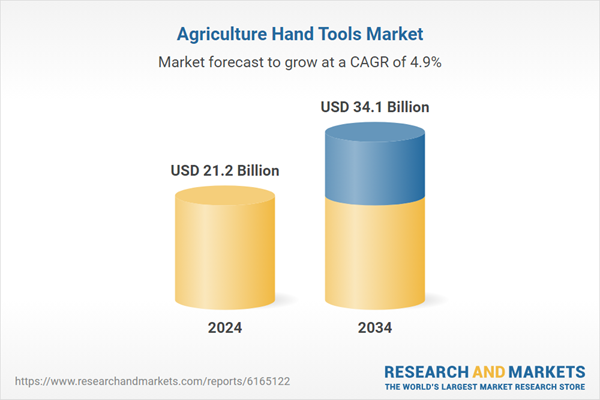Key companies in this market are focusing on enhancing their product portfolios, entering regional partnerships, and expanding globally to improve their footprint. The development of user-friendly, lightweight, and ergonomically designed tools that reduce strain and improve accuracy has become central to new launches. Manufacturers are also prioritizing environmentally friendly options to meet growing customer expectations. Changes in distribution, such as the rise of digital platforms and outreach to rural supply chains, help improve access to these tools. In a price-sensitive sector, product durability, functionality, and brand perception significantly influence purchasing behavior. A substantial portion of market demand stems from farmers and growers who rely on reliable tools for daily operations.
The Hand trowels and cultivators segment generated USD 5.5 billion in 2024, leading the product category due to their importance in tasks like planting, transplanting, aerating soil, and fertilizing in small spaces. These tools are adopted in applications ranging from home gardening to large-scale agriculture and landscaping. Their compact form and precision make them ideal for confined environments such as container gardens, vegetable beds, and ornamental patches - especially in urban and suburban settings where space is limited.
The farmers and growers segment held a 47.5% share in 2024. This user group forms the backbone of tool demand due to their daily involvement in core crop production, from soil preparation to harvesting. Manual equipment such as hoes, pruning tools, spades, and hand cultivators play a key role in the workflows of small- to mid-sized farms, particularly those embracing organic and sustainable farming methods.
U.S. Agriculture Hand Tools Market generated USD 2.7 billion in 2024. The country’s expansive farming industry, which merges traditional methods with advanced agri-tech, plays a pivotal role in the global agricultural economy. As one of the top producers and exporters of crops and livestock, the U.S. integrates modern techniques like automation, smart farming, and real-time data monitoring. Growing consumer interest in organic produce and eco-conscious practices continues to shape farming trends, while policy support and R&D investments further influence equipment adoption.
Notable companies shaping the Global Agriculture Hand Tools Market include Stanley Black & Decker, Corona Tools, GARDENA, Fiskars Group, WOLF-Garten, A.M. Leonard, Ames True Temper, Truper, Bahco, Griffon, Husqvarna, Lowell Corporation, JCB Tools, Walter Stern Inc., and Vaughan & Bushnell. Leading players in the agriculture hand tools market are focusing on innovation, localization, and sustainability to strengthen their market standing. Many manufacturers are investing in R&D to produce tools with improved ergonomics and durability while keeping materials lightweight and environmentally responsible. Partnerships with regional distributors and agricultural cooperatives are enabling deeper rural penetration and wider product accessibility. Companies are expanding online retail channels to reach tech-savvy farmers and urban gardeners, while also leveraging data to refine product offerings.
Comprehensive Market Analysis and Forecast
- Industry trends, key growth drivers, challenges, future opportunities, and regulatory landscape
- Competitive landscape with Porter’s Five Forces and PESTEL analysis
- Market size, segmentation, and regional forecasts
- In-depth company profiles, business strategies, financial insights, and SWOT analysis
This product will be delivered within 2-4 business days.
Table of Contents
Companies Mentioned
The key companies profiled in this Agriculture Hand Tools market report include:- A.M. Leonard
- Ames True Temper
- Bahco
- Corona Tools
- Fiskars Group
- GARDENA
- Griffon
- Husqvarna
- JCB Tools
- Lowell Corporation
- Stanley Black & Decker
- Truper
- Vaughan & Bushnell
- Walter Stern Inc
- WOLF-Garten
Table Information
| Report Attribute | Details |
|---|---|
| No. of Pages | 170 |
| Published | August 2025 |
| Forecast Period | 2024 - 2034 |
| Estimated Market Value ( USD | $ 21.2 Billion |
| Forecasted Market Value ( USD | $ 34.1 Billion |
| Compound Annual Growth Rate | 4.9% |
| Regions Covered | Global |
| No. of Companies Mentioned | 16 |









